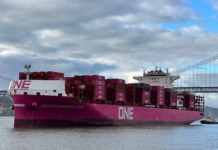Global freight markets remain on alert following the outbreak of hostilities between Israel and Iran, although immediate impacts have been limited.
Meanwhile, evolving dynamics in the US-China trade war, shifting shipping capacity, and fluctuating rates across key trade lanes are shaping a complex and volatile logistics landscape.
Despite rising concerns, the Strait of Hormuz, a chokepoint for nearly 20% of global oil shipments, continues to operate normally. Analysts note Iran may hesitate to close the waterway due to its own reliance on oil exports and adequate current global supply levels, which could dampen any potential price spikes.
While only 2–3% of global container volumes move through the strait, a closure would cut access to Dubai’s Port of Jebel Ali, a major transshipment hub. This could force carriers to divert cargo to South Asian ports, triggering congestion and rate hikes.
ZIM Lines confirmed that operations at Haifa and Ashdod ports remain unaffected despite Iranian missile and drone activity.
The Israel–Iran conflict also overlapped with President Trump’s early departure from the G7 summit in Canada, signaling a renewed focus on foreign policy and trade.
While the US is reportedly close to a trade deal with Pakistan, Trump warned that countries without finalized agreements may face unilaterally imposed tariffs once the current pause expires in July.
A federal court ruled that voided tariffs may remain in effect pending appeal, potentially extending duties on China beyond August 12.
Trump announced tentative terms with China, but both sides intend to keep current tariffs in place 30% on Chinese goods and 10% on US goods fueling uncertainty.
Amid tariff ambiguity, US shippers frontloaded peak season cargo following the May 12 de-escalation. The NRF’s container forecast suggests that this early push may have pulled volumes forward, weakening the July peak season outlook.
Transpacific spot rates to the U.S. West Coast, while initially rising, are already down 3% week-on-week, undermining carrier attempts to implement GRIs (General Rate Increases) on June 15 and July 1.
Carriers that restored suspended services and added capacity in anticipation of stronger demand may now face overcapacity, leading to ad hoc sailing cancellations and half-full departures.
Some transpacific capacity has been reallocated to Asia–Europe trades, supporting rising spot rates:
- Asia–Europe rates have surged 24% in June to around $3,000/FEU.
- Asia–Mediterranean rates hit $4,846/FEU, up almost 50% from late May, but have since eased to $4,500, possibly reflecting early signs of overcapacity.
Air freight rates between China and the US remained stable last week at $5.29/kg, slightly down from the late-May spike to $5.40/kg. That bump was largely driven by short-term demand surges following tariff reductions.
Carriers are redirecting air capacity to other lanes like Asia–Europe, though so far, rate levels remain steady.
From Middle Eastern conflict zones to global tariff shifts, the current freight landscape highlights the need for agile, data-driven decision-making. With traditional patterns disrupted by both geopolitical and economic tensions, stakeholders must stay alert to sudden changes in trade flow, regulatory shifts, and market sentiment.
Amid early peak season shifts, policy turbulence, and volatile rates, the freight sector’s path forward will depend heavily on resilient planning and coordinated responses across global supply chains.
Author of the article: Judah Levine, Head of Research at Freightos





